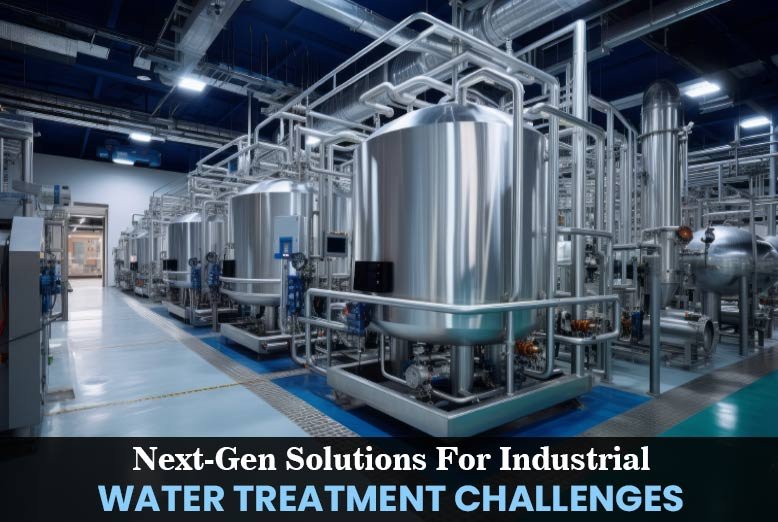Water is a critical resource, and its effective treatment is central to the industrial water treatment industry. As you explore this field, understanding the advancements and challenges becomes essential. This sector ensures clean water availability while upholding stringent environmental standards.
Facing new challenges, from emerging pollutants to adapting to regulatory changes, the industry is embracing innovative solutions. These next-gen approaches are reshaping water treatment, promising efficiency and sustainability. Read on to discover the technologies and practices driving this transformation.

The Current State Of Industrial Water Treatment
Traditional methods, such as chemical treatment, sedimentation, and filtration, have long been staples in industrial water treatment. These processes, designed to meet basic regulatory standards, have been effective in addressing conventional pollutants.
However, as the industry evolves, these methods now face limitations in handling today’s diverse and complex waste streams.
Emerging Challenges In Industrial Water Treatment
The industrial water treatment industry is increasingly confronting new challenges that demand innovative and advanced solutions for environmental safety and industrial efficiency.
- Micro-Pollutants: Traditional treatment methods often fall short in removing micro-pollutants, such as pharmaceuticals and synthetic chemicals, from modern industrial processes, posing a threat to water quality.
- Climate Change Impact: The effects of climate change, including extreme weather events, challenge current water treatment systems with increased water scarcity and quality issues, necessitating more resilient solutions.
- Industrial Expansion: The growth and diversification of industries lead to a higher variety and volume of effluents, calling for more versatile and efficient treatment methods.
- Regulatory Compliance: Continuously evolving regulations to preserve water quality and ecosystem health require industries to adopt more sophisticated treatment technologies.
- Resource Scarcity: Efficient use and recycling of water are critical due to dwindling water resources, highlighting the need for innovative water management practices.
These challenges set the stage for the urgent need for next-gen solutions capable of tackling these multifaceted challenges.
Advanced Filtration Technologies
Innovations in advanced filtration technologies provide efficient solutions for challenging pollutants. Notable technologies include:
- Nano-filtration: Specialized in removing finer particles and dissolved substances, nano-filtration is effective against micro-pollutants. Its precision in filtering makes it crucial for purifying water to increasingly stringent standards.
- Reverse Osmosis: These systems effectively handle highly contaminated water sources, such as seawater. The integration of antiscalants in these systems ensures sustained efficiency aside from preventing scale buildup.
- Ultrafiltration: Utilizing fine membranes, ultrafiltration is essential for applications requiring exceptionally clean water, such as in pharmaceuticals and food production, effectively removing suspended solids and microorganisms.
These technologies are central to advancing industrial water treatment and achieving higher water purification standards.
Innovative Treatment Methods
Emerging challenges in industrial water treatment have spurred the development of innovative treatment methods such as:
- Membrane Bioreactors (MBRs): These uniquely combine membrane filtration with biological treatment, which is ideal for managing high-load waste streams. Their efficiency and space-saving benefits make them suitable for various industrial settings.
- Electrocoagulation: Utilizing electrical currents for coagulation, this method effectively removes various contaminants. Electrocoagulation is appreciated for its versatility and minimal sludge production, marking a shift towards greener treatment options.
- Advanced Oxidation Processes (AOPs): These target stubborn pollutants, such as pharmaceuticals and pesticides, using reactive chemicals. They’re integral in addressing contaminants that traditional methods cannot handle.
These techniques are reshaping the water treatment industry, enhancing operational efficiency and sustainability.
Automation And AI in Water Management
The integration of automation and AI enhances precision and efficiency in industrial water treatment. Key developments include:
- Smart Sensors: These provide real-time monitoring of water quality, enabling proactive system management and optimization, which is vital for maintaining consistent treatment standards.
- Predictive Analytics: AI-driven analytics forecast system performance and potential issues, facilitating preemptive maintenance and efficient resource allocation. This significantly reduces downtime and improves operational efficiency.
- Automated Control Systems: These systems streamline treatment processes, adjusting operations in real-time for optimal performance, thereby increasing efficiency and reducing human error.
This technological leap in automation and AI is transforming water management, making it more reliable and adaptive to changing treatment demands.
Sustainable Practices In Industrial Water Treatment
Adopting sustainable practices is essential in industrial water treatment, focusing on conserving resources and protecting the environment. These practices include:
- Water Recycling And Reuse: This approach involves treating and reusing industrial wastewater, significantly conserving water resources. It helps industries reduce their reliance on freshwater supplies, playing a crucial role in sustainable water management.
- Energy-Efficient Treatment Processes: The adoption of energy-efficient processes reduces both the carbon footprint and operational costs of water treatment. Innovations like low-energy filtration and solar-powered treatment systems exemplify this shift towards greener practices.
- Zero Liquid Discharge (ZLD) Systems: ZLD technologies aim to eliminate wastewater discharge, thus preventing environmental pollution. By completely recycling and recovering water, these systems are integral in promoting sustainable water use in industries.
Embracing these sustainable practices is vital for the industrial water treatment sector, aligning environmental stewardship with resource conservation for long-term sustainability.
Final Thoughts
The advancements in industrial water treatment mark a significant stride towards a more efficient and environmentally responsible future. These innovations reflect a growing awareness and response to the needs of our planet and industries alike.
By integrating these next-gen solutions, the industry sets a precedent for progress and sustainability. It’s a testament to our ability to adapt and thrive, ensuring a healthier environment and a resilient industrial sector for generations to come.





